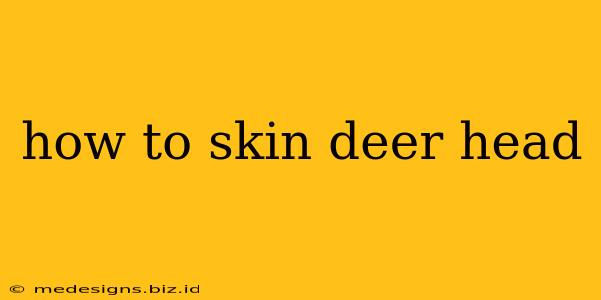Skinning a deer head is a crucial step in taxidermy, preserving a beautiful trophy for years to come. This detailed guide will walk you through the process, ensuring you achieve a clean, successful skinning job. Whether you're a seasoned hunter or a first-timer, following these steps will maximize your chances of success.
Tools You'll Need for Skinning a Deer Head
Before you begin, gather the necessary tools. Having everything prepared beforehand makes the process much smoother. You'll need:
- Sharp knife: A scalpel or a very sharp hunting knife is ideal. Dull blades will tear the skin, ruining your work.
- Fleshing knife: This specialized knife helps remove the remaining flesh and fat from the hide.
- Scissors: Useful for cutting around the ears and lips.
- Scraper: A metal scraper or a specialized taxidermy tool will help remove any remaining tissue.
- Borax or other preserving powder: This helps prevent decay and keeps the hide supple.
- Gloves: Protect your hands from bacteria and the sharp knife.
- Eye protection: Protect your eyes from any stray hairs or debris.
Step-by-Step Guide to Skinning a Deer Head
1. Preparation is Key:
- Field Dressing: Ideally, you'll have already field-dressed your deer, removing the guts and internal organs. This prevents spoilage and makes skinning easier.
- Location: Choose a clean, well-lit area to work in. A sturdy table is recommended.
2. Making the Initial Incisions:
- Start at the Nose: Carefully make an incision around the nostrils, extending it back to the base of the ears.
- Cut Around the Ears: Continue cutting around the ears, keeping your knife close to the skull.
- Cut the Lips: Carefully cut around the lips, separating the skin from the jaw.
- Cut Down the Neck: Extend the incision down the neck, stopping where you'll be separating the head from the body.
3. Carefully Separating the Skin from the Skull:
- Work Methodically: Use your knife to carefully separate the skin from the skull, working your way around the head. Be patient and take your time; rushing can lead to tears.
- Use Your Fingers: Use your fingers to help loosen the skin from the skull, especially around the eyes and the back of the head.
- Be Mindful of the Eyes: Work around the eyes carefully to avoid puncturing them.
- The Back of the Head: The back of the head can be a bit more challenging; take your time and be extra careful.
4. Removing the Skin from the Head Completely:
- Once the skin is mostly free: Pull the skin gently over the skull to remove it completely.
- Work Gradually: Avoid pulling too hard, which could tear the skin.
5. Cleaning and Preserving the Skin:
- Fleshing: Use your fleshing knife to carefully remove any remaining flesh, fat, and tissue from the hide.
- Scrapping: Use a scraper to remove any remaining bits.
- Cleaning: Thoroughly clean the skin with water and a mild detergent.
- Preservation: Apply borax or your chosen preserving powder to the skin. This will help preserve the skin and prevent decay.
6. Final Steps:
- Proper Drying: Allow the skin to dry completely before further processing. This is essential for long-term preservation.
Tips for Success
- Sharpness is crucial: A sharp knife is essential to prevent tearing.
- Patience is key: Take your time, and work methodically. Rushing will likely result in mistakes.
- Practice makes perfect: Don't be discouraged if your first attempt isn't perfect. Practice makes perfect.
This guide provides a comprehensive approach to skinning a deer head. Remember, safety and patience are paramount. With careful attention to detail, you can successfully skin a deer head and preserve a valuable trophy.
